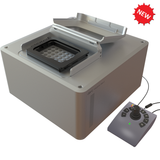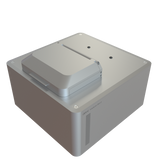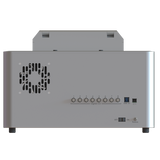VoluScan™ Gen.2
-
VoluScan™ is an epifluorescence mesoscope that enables 1- or 2-color functional imaging of large sample volumes at a cellular resolution. VoluScan™ is designed to image fluorescent sensors (like GCaMP, jRGECO, dLight, etc.) in large 3D biological samples such as organoids, assembloids, brain slices, and cell cultures, but can also be used to study cell migration, division, or other processes. Furthermore, the system is compatible with Tokai Hit incubation chamber and can synchronize imaging with other systems using external digital triggers. Thus, VoluScan™ pairs readily with Light Sources (for optogenetics or uncaging), electrophysiology recordings, liquid infusion, etc.
Gen.2 of VoluScan is fitted with a motorized 3D stage to sequentially image multiple regions of large sample plates (well culture plates, Petri dishes, …) for high-throughput imaging. Simply leaving VoluScan overnight after defining regions of interest can greatly accelerates data collection.
The VoluScan™ has an extensive field of view (up to 5 mm) with subcellular resolution (2.7 µm), and covers a large depth (up to 1.5 mm). Specifically, the VoluScan™'s multi-plane imaging system enables scanning such volumes at high sampling rates:
- 4-planes (1-color) at 16 FPS
- 8-planes (1-color) at 10 FPS
Each VoluScan system includes a VoluScan's multi-plane disc that determines the number of imaging planes (4 or 8), the z-stack steps, and the total imaging depth. By default, the z-stack increments are available in 50 µm, 100 µm or 150 µm steps (others on custom request). These discs are interchangeable to fit the needs of different experiments and can be purchased separately.
Check out the first bioRiv publication of assembloid data collected with VoluScan™Gen.1. Miura et al. (2024), used the VoluScan's large FOV and fast z-scanning capabilities to image the live, calcium dynamics of over 400 cells per assembloid and demonstrated a functioning model of the cortico-striatal-thamalic-cortical circuit. Learn more

-
* compatible with Tokai Hit incubation chamberGeneral properties: Field of view
3.2 mm x 5.0 mm
Objective NA
0.16 Magnification
2.2x
Working distance 5 mm Configuration inverted* Mechanicals stage travel X: 120 mm
Y: 100 mm
Z: 6 mmDimensions 210 x 320 x 400 mm Computer interface 1x USB2.0 port + 1x USB3.0 port Z stack properties Number of planes 4, 8
Step
50, 100 or 150 µm**
Maximum depth range
1.5 mm
Sensor Type
CMOS Image Sensor*** Quantum efficiency
82% at 520 nm
Resolution 1920 x 1200 pixels
Pixel Size 5.86 µm x 5.86 µm 1-color
Spectral bandwidth
Excitation: 460-490 nm
Emission: 500-550 nmMaximum framerate (full FOV)
1 plane: 80 FPS
4 planes: 16 FPS
8 planes: 10 FPS2-color
Spectral bandwidth Excitation #1: 400-410 nm or 410-420 nm
Excitation #2: 555-570 nm
Emission #1: 500-540 nm
Emission #2: 580-680 nm
Maximum framerate (full FOV) 1 plane: 40 FPS
4 planes: 8 FPS
8 planes: 5 FPSDI/O
Number of ports
4
Input voltage 0 to 5.0 V (Maximum) TTL level HI > 3.3 V
LOW < 1.5 V
Output voltage TTL 5.0 V (High impedance) Output Current max 20 mA per channel Maximum sampling rate
10 kSps
Maximum output frequency
5 kHz
** other value on custom request
***Andor sCMOS on custom request -
Drawing VoluScan™ Gen.2
- le choix d'une sélection entraîne une actualisation complète de la page






